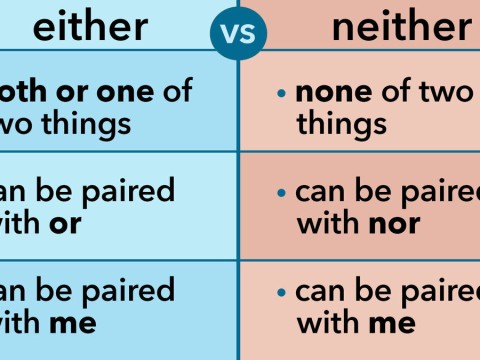重要
either
🇬🇧/ˈaɪðə(r)/ 🇺🇸/ˈiːðər/📚 558 5中考高考You use either in front of the first of two or more alternatives, when you are stating the only possibilities or choices that there are.与(or)连用,表示几个可选项中只能选其一
conjunction [并列连词]或者,要么;两者都(不),既(不)
You use either in a negative statement in front of the first of two alternatives to indicate that the negative statement refers to both the alternatives.
用于否定句中,表示“两者都不”
pronoun [指示代词](两者之中)任意一个;两者都(不)
You use either in a negative statement to refer to each of two things, people, or situations to indicate that the negative statement includes both of them.
用于否定句中,表示“两者中任何一个都不”
adverb [方式副词]也(不),亦(不);而且,还
Don't agree, but don't argue either.
不要赞同,但是也不要争辩。
adjective [原级](两者中的)每个的,各方的
...a special Indian drug police that would have the authority to pursue suspects into either country. …
有权到这两国中任意一国追捕嫌犯的一位印度缉毒特警。
- either 出现在下面的课文中(提供视频、音频及笔记等可系统性学习)
- Lesson 049&50 At the butcher’s either 副词: 也(用于否定句)
- Lesson 113&114 Small change either 副词: (两者之中)任意一个
- Lesson 079&80 Carol’s shopping list
- Lesson 107&108 It’s too small
- Lesson 48 Did you want to tell me something?
- Lesson 12 Life on a desert island
单词造句:
- 网友用“Either”造句精选
- There had been no indication of either breathlessness or any loss of mental faculties right until his death. 直到去世,他既没有出现呼吸困难也没有脑功能丧失的迹象。
- There were glasses of iced champagne and cigars. Unfortunately not many of either were consumed. 有很多杯冰镇香槟和雪茄。可惜两样东西中哪一样都没被受用多少。
- Do either of you smoke or drink heavily? 你们俩当中有谁抽烟、喝酒凶吗?
- ...a special Indian drug police that would have the authority to pursue suspects into either country. …有权到这两国中任意一国追捕嫌犯的一位印度缉毒特警。
- She warned me that I'd never marry or have children.—"I don't want either." 她警告我说我永远不会结婚、生孩子。—“我哪一样都不想要。”
- There are no simple answers to either of those questions. 对那两个问题哪一个都没有简单的答案。
- He sometimes couldn't remember either man's name. 他有时候这两个男人谁的名字都记不起来。
- He did not even say anything to her, and she did not speak to him either. 他甚至什么都没跟她说,而她也没跟他说话。
either的重要知识点
| Also 也,此外 | 用法: 常用于肯定句中,表示“此外”、“另外”,通常放在动词前面(实义动词前,助动词或情态动词后),或者主语之后,也可以放在句首连接句子。 |
|---|---|
| She is a doctor, and she also teaches at the university. 她是一名医生,她也在大学教书。 Also, I'd like to thank my family for their support. 此外,我还要感谢我的家人对我的支持。 | |
| Too 也 | 用法: 常用于肯定句的句末,表示“也”、“同样”,语气比较随意。 |
| I like pizza, and I like pasta, too. 我喜欢披萨,我也喜欢意大利面。 Nice to meet you. Nice to meet you, too. 很高兴认识你。我也很高兴认识你。 | |
| Either 也(不) | 用法: 专门用于否定句的句末,表示“也不”。在否定句中,不能用 also 或 too。 |
| I don't like coffee, and she doesn't like it, either. 我不喜欢咖啡,她也不喜欢。 He won't come to the party, and I won't go, either. 他不会来参加派对,我也不会去。 |
